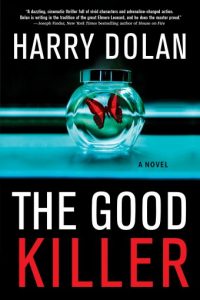There must be people somewhere who lead charmed lives. They make no mistakes and have no regrets. Their days flow along pleasantly, each one better than the last. All their memories are good ones. There must be people like that, but if there are, I haven’t met them. I don’t think I’d like to read about them either. Their stories would grow stale awfully fast. And I know I wouldn’t want to write about them.
When I began to work on my latest novel, The Good Killer, I knew a handful of things about the protagonist, Sean Tennant. I knew he was haunted: haunted by what he’d seen during his military service in the Iraq war, and haunted by something he’d done after he returned home. By a burglary he had committed that had gone terribly wrong. I knew that he and his lover, Molly Winter, had fled from their old lives and gone into hiding, and that they had enemies who wanted them dead. I knew Sean and Molly had found a measure of peace living in a new city under new identities, and I knew it wouldn’t last. Because you can’t hide forever, and the past has a way of catching up.
I make no claim to originality here. Some of my favorite books are about the past catching up. Here are eight of them: stories of people who can’t escape their histories, no matter how much they may want to.
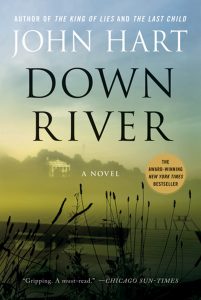
John Hart, Down River
This is the book that earned John Hart his first Edgar award, and it’s a rich, literary thriller. At the age of twenty-three, Adam Chase is put on trial for the murder of a high-school football player in his North Carolina hometown. The jury acquits him, unable to find a motive, but the damage is done. Even Adam’s family has doubts about his innocence. He leaves home, hoping to find a new life in New York. Five years later he’s back, drawn by a cryptic letter from an old friend. He’s not expecting a warm welcome, and he doesn’t get it. Some of the locals beat him up, and things go downhill from there. A young woman is violently assaulted and Adam comes under suspicion once again. The old friend he came back to see is missing, and soon turns up dead. Adam sets out to learn the truth about what happened, reconnecting with a lost love and uncovering his own family’s darkest secrets.

Karin Slaughter, Pretty Girls
Family history also lies at the heart of Karin Slaughter’s novel Pretty Girls, which revolves around a pair of sisters, Claire and Lydia. As teenagers growing up in Atlanta, the two girls experienced a heart-breaking tragedy: the disappearance of their older sister, Julia. From that point, their lives diverged. Lydia turned to drugs and petty crime; Claire married Paul Scott, a wealthy businessman, hoping he would take care of her. Years later, as the novel opens, Claire and Paul’s marriage seems to be a happy one. They meet for drinks at a bar and afterward duck into an alley for a playful make-out session. There they encounter a thief with a knife, and Paul, trying to protect Claire, is stabbed to death before her very eyes. After the funeral, as she’s looking through Paul’s effects, Claire discovers a cache of violent pornography on his computer: videos of young women being tortured and killed. The police are unhelpful, claiming that the videos look staged, but to Claire they seem real, and they lead her to doubt everything she thought she knew about her husband. She confides in her estranged sister Lydia, and the two of them set out to uncover Paul’s secrets, eventually coming to believe that he had a part in Julia’s long-ago disappearance. Slaughter builds the tension expertly, throwing in a series of twists and revelations that lead to an action-packed finale.

James Renner, The Man from Primrose Lane
James Renner’s protagonist, David Neff, is a writer who has reached the pinnacle of success with a true crime book about an Ohio serial killer. He’s also a man in mourning, broken by the suicide of his beloved wife Elizabeth and doing his best to raise their young son alone. When his editor comes to him with an idea for a new book, David wants no part of it, but he is drawn in against his will by the strange tale his editor tells him, about an elderly hermit found murdered just two days after Elizabeth’s death. As David investigates the killing of this man who lived on Primrose Lane, he begins to find connections between the man and Elizabeth. What he discovers ultimately leads him back to the case that made his career: the case of Ronil Brune, who was falsely convicted of the murders of several young girls and ultimately executed for those crimes. As David digs ever deeper into the past, Renner’s novel takes wildly unpredictable turns, transforming from a crime novel into something more: part horror, part science fiction. This is a gem of a book: ambitious, intricately conceived, and beautifully written.

Gillian Flynn, Dark Places
It’s fair to say that at the beginning of Dark Places, Libby Day’s life lies in ruins. At thirty-two, she has no job, no friends, and no family. Her mother and two sisters were murdered in their rural Kansas home when she was seven; her brother Ben is serving a life sentence for the crime. Libby has been living off a trust fund—money donated by strangers who heard her story and took pity on her—but now the money has run out and she’s thinking about suicide. Out of the blue, she receives a letter from Lyle Wirth, a twenty-something oddball who’s part of a group of true-crime enthusiasts called the Kill Club. The club’s members believe Libby’s brother was wrongly convicted, and they’re willing to pay her if she’ll help them prove it. With nothing better to do, Libby accepts and sets out to visit her estranged, homeless father, her imprisoned brother, and other figures from her past. Gillian Flynn’s writing is razor sharp, letting Libby tell her story in her own cynical and often darkly funny voice. The main narrative is intercut with flashbacks to the day of the murders from the point of view of Libby’s mother and brother. As these flashback scenes reveal the truth of what happened that day, Libby’s story takes a surprising turn, driving her into the path of a killer.
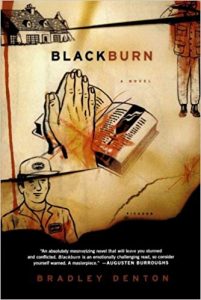
Bradley Denton, Blackburn
Bradley Denton is primarily a writer of offbeat science fiction (think: Buddy Holly Is Alive and Well on Ganymede), but I first became familiar with his work through this ingenious, episodic serial-killer novel. Jimmy Blackburn is a child of the small-town Midwest, raised in desperate poverty by a well-meaning mother and an abusive father. He’s smart enough to recognize when the adults he should be able to trust are lying to him; he’s sensitive to the petty acts of injustice going on all around him. On his seventeenth birthday he sets out to buy a used car and after a misunderstanding ends up at odds with a police officer who wants to arrest him for trespassing. Jimmy wrestles the officer’s gun away and shoots him, and that act of violence seals his fate. He’s forced to flee his home, and over the next several years we follow him as the tally of his victims grows. In Jimmy’s mind, each of them deserves to be killed: there’s a thief, crooked auto mechanic, a callous army recruiter, a husband who beats his wife. Denton portrays his antihero’s crimes with a brilliant blend of realism and satire, creating in Jimmy Blackburn a tragic and unforgettable character.
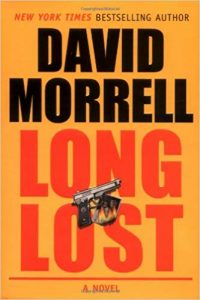
David Morrell, Long Lost
The set-up of this thriller by David Morrell is a simple one: at an after-school baseball game, thirteen year old Brad Denning gets annoyed with his younger brother, Petey, and tells him to go home. But Petey never makes it home; he vanishes without a trace. Twenty-five years later, Brad is a successful architect in Denver with a wife and a son, but he can’t forget his lost brother or escape his own feelings of guilt about what happened. One day a rough-looking stranger approaches him on the street, claiming to be Petey and telling him a story about his childhood abduction. Skeptical at first, Brad eventually comes to believe the story and welcomes Petey into his home, thrilled to have his brother back. Hoping to restore their bond, Brad invites Petey to join him on a camping trip, and there things take a dark turn. As they’re hiking together, Petey pushes Brad from a cliff into a deep chasm and leaves him to die. Brad manages to make his way out, but when he returns home he finds that Petey has kidnapped his wife and son and fled. When the police and FBI have no success in finding them, Brad takes on the job himself, setting out on a tangled path to recover his family and learn the truth about the man who claims to be his brother.
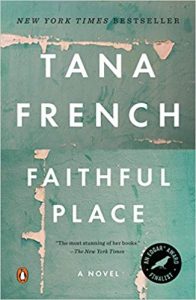
Tana French, Faithful Place
The narrator of Tana French’s third novel is Frank Mackey, a tough undercover cop who grew up in a large family in a poor neighborhood of Dublin. It’s the kind of place you hope to get away from, and at nineteen Frank planned to do just that: he arranged to run off with his sweetheart, Rosie Daly, and start a new life with her in London. But on the night they were meant to depart, Rosie stood him up, leaving only a note behind. Assuming she’d gone on to London alone, Frank never spoke to her again. Flash forward two decades and Frank has made his escape from his childhood home and built a career with the Dublin police. He has an ex-wife and a young daughter, and his only contact with his parents and siblings is through his sister Jackie. She’s the one who gives him the news that a suitcase has been found behind a fireplace in an abandoned house on their old street—the very place where Frank was supposed to meet Rosie all those years ago. When Frank sees the suitcase he recognizes it at once as Rosie’s, and soon after, he discovers Rosie’s body buried under the floor of the basement in the same house. Given Frank’s connection with the victim, his superiors want to keep him far away from the case, but Frank can’t let things lie. Before long he’s drawn back into old family relationships: with his disapproving mother and alcoholic father, and with the brothers and sisters who stayed behind in the old neighborhood. French illuminates these relationships with the sharp dialogue and subtle characterizations that have become her trademark, and she provides a solution to the mystery of Rosie’s death that is both satisfying and devastating.
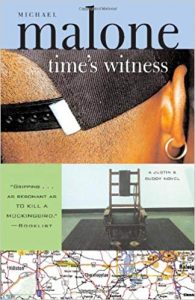
Michael Malone, Time’s Witness
Michael Malone has written three books set in the fictional college town of Hillston, North Carolina, featuring homicide detectives Justin Savile and Cuddy Mangum. Time’s Witness is the middle book, and the only one narrated by Cuddy, a Vietnam veteran who was born on the wrong side of the tracks, in contrast to the aristocratic Justin. The book’s central plot revolves around a decades-old killing of a police officer by an African American man named George Hall. As the story opens, Hall is on death row awaiting execution, but he is unexpectedly granted a reprieve and a new trial. Not long after, Hall’s younger brother, a civil rights activist, is shot and killed in Hillston, and Cuddy and Justin must solve the murder and try to keep the peace as racial tensions grow. Malone populates the book with a colorful cast of characters, including Isaac Rosethorn, the lawyer who takes up George Hall’s defense at his new trial, arguing that he acted in self-defense against a corrupt police officer. Interwoven with the main story is a subplot involving Cuddy and a woman from his past, Lee Haver. Cuddy and Lee were once lovers, but she was the daughter of a wealthy family, and believing her to be beyond his reach, he let her get away. Now she’s back in Hillston, married to a politician running for governor of North Carolina, but Cuddy can’t help being drawn back to her. Malone is a masterful storyteller, and Time’s Witness succeeds abundantly as a mystery and a legal thriller—and as a tale of a man haunted by what might have been.


